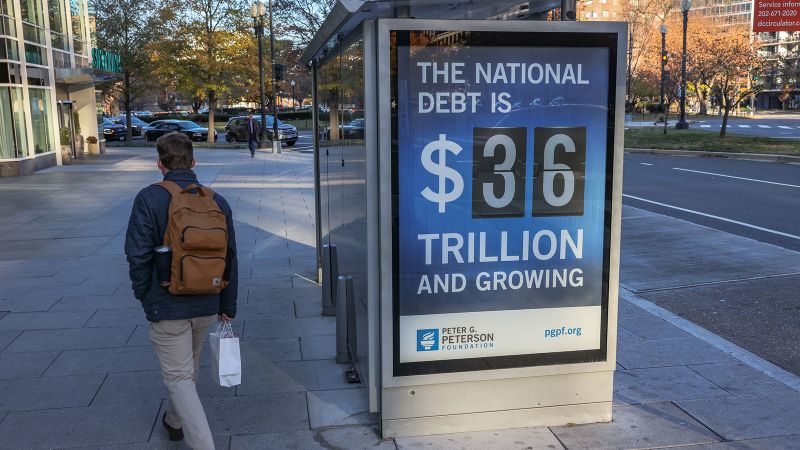New York
CNN
—
One of America’s closest allies recently raised eyebrows for threatening to fire off the ultimate financial weapon against Washington in trade talks: dumping US debt.
Japanese Finance Minister Katsunobu Kato, whose country is the biggest holder of US Treasuries, said on Friday that selling the assets is a “card on the table” in tariff negotiations, according to The Associated Press.
“It does exist as a card, but I think whether we choose to use it or not would be a separate decision,” Kato said.
Two days later, the Japanese official walked back the comment, stressing on Sunday that the longtime US ally is “not considering the sale of US Treasuries as a means of Japan-US negotiations.”
Japan was unlikely to fire this big bazooka in the trade war anyway, since selling US Treasuries is considered an extreme move — one that would likely backfire, experts say. Still, the short-lived threat raises an ugly truth: The United States relies on other countries buying its $36 trillion mountain of debt.
It’s another way that President Donald Trump’s aggressive trade war could hurt the American economy: Tariffs have the potential to reduce the amount of capital seeking a home in American assets, which could lift interest rates and hurt the value of the US dollar. Even if a large-scale Treasury selloff is unlikely, other nations — including one of America’s closest allies — are clearly considering all options.
As America’s biggest foreign creditor, Japan sits on $1.1 trillion of US Treasuries. That gives Tokyo some leverage as it seeks to hammer out a trade deal with the White House.
If Japan sold massive amounts of US debt, it would very likely spark a massive Treasury selloff. Treasury rates would in turn sharply increase, making it more expensive for Washington to borrow and freaking out investors along the way.
“It would send shockwaves around world financial markets if one of the most reliable buyers of Treasuries is no longer reliably in the market for it,” said Ernie Tedeschi, director of economics at the Budget Lab at Yale and a chief economist in the Biden administration.
Recall that fears of a bond market catastrophe helped convince Trump decided to pause so-called “reciprocal tariffs” on April 9.
And Washington doesn’t just rely on Japan to buy its debt.
China has been slapped with tariffs of at least 145% on most goods, but it is also America’s second-biggest foreign creditor, with $784 billion of Treasuries as of February, according to federal data.
The United Kingdom, which faces a 10% tariff, is America’s third-largest foreign creditor, with $750 billion of US Treasuries. And the sixth-biggest holder of US Treasuries, Canada, is being threatened with more tariffs if it does not join the United States as the 51st state.
But for these nations, dumping US debt, especially in a fire sale, would risk destabilizing global markets as well as their own.
Moreover, it would hurt their own investments and that of their banks and citizens. Their own currencies could also sharply increase in value, making it harder to sell their goods overseas.
“Threatening to dump an asset of which it is a major holder means that Japan can hurt itself in the process,” Win Thin, global head of market strategy at Brown Brothers Harriman, wrote in a note to clients on Monday. He wrote that this kind of threat is “always a double-edged sword.”
Maury Obstfeld, senior fellow at the Peterson Institute for International Economics, told CNN that Japan’s comments seem “very rash” and amount to “just a silly response.”
“No one wants to sell a lot of Treasuries quickly because they would take losses on their entire portfolio, and Japan’s is vast,” Obstfeld said. “This would also invite massive tariff retaliation.”
Moreover, as Obstfeld notes, Japan needs Washington to defend itself in the volatile Asia-Pacific region. It wouldn’t want to do anything to cast doubt on that support from the American military.
“The fact is that US Treasuries are so central to world financial markets that it’s really hard to damage the United States – without hurting yourself in the process,” said Yale’s Tedeschi.
Still, the warning from Japan does speak to a broader issue.
“Both theory and data show that trade tariffs reduce net capital inflows,” said Kent Smetters, professor of business economics and public policy at the University of Pennsylvania’s Wharton School.
Smetters, who runs the Penn Wharton Budget Model, noted that capital was indeed leaving the United States and rates were rising before Trump announced his pause on reciprocal tariffs.
“If the tariffs are fully implemented, the US will need to sell its future debt… at lower prices and higher yields,” Smetters said. “More tax cuts, instead of helping offset some of the negative effects of tariffs, will add to the debt at a time when it will become more costly to do so.”

